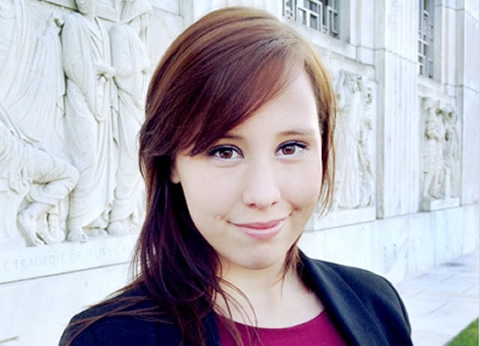Cool Job: Digital Texts Co-editor and Interface Architect at the Folger Shakespeare Library in Washington, DC
By the time she graduated from the Faculty of Information (after having earned undergraduate and master’s degrees in English at U of T), Rebecca Niles had already landed a job at the Folger Shakespeare Library – home to the world’s largest collection of Shakespeare materials – on Capitol Hill in Washington, DC.
How did you first get involved in a project at the Folger Shakespeare Library?
For the past three years, and largely under the guidance of U of T professor Alan Galey, I studied both the past and the future of the book. This left me well-equipped to consider the transmission of texts over time, and to assess how texts can make the transition from print to digital in a way that respects their essence and yet takes advantage of new capabilities. This is at the heart of Implementing New Knowledge Environments, a major collaborative research initiative that I worked on with Prof. Galey. When the Folger Shakespeare Library decided to go digital with their celebrated Folger Shakespeare Library Editions, the original editors, Paul Werstine and Barbara Mowat, reached out to Prof. Galey. The Folger wanted someone to work with their in-house programmer to create digital texts that met the editorial standards of Mowat and Werstine, and who would also think critically about how readers should be able to access, navigate, search, and read these texts.
What are the “Folger Digital Texts?”
Folger Digital Texts is an emerging repository of digital editions based on the popular Folger Shakespeare Library Editions. This project will make modern, expertly edited Shakespeare texts freely available to all for non-commercial use. The digital editions we’re creating have unique identifiers for every word, every space, and every punctuation mark in every text. This encoding structure allows me, as interface architect, to create a web interface to search, navigate, read, and bookmark any part of Shakespeare’s plays. The structure can also be used by outside researchers and developers to develop their own digital Shakespeare projects. The 12 plays currently available include Hamlet, A Midsummer Night’s Dream, and Romeo and Juliet.
What kind of impact do you think your U of T education will have on your career?
The iSchool program both gave me broad exposure to issues in information studies and allowed me to focus on my research interests. The connections I have made as a result of being a thesis student of Prof. Galey continue to pay career dividends. I am now in an ideal position to launch my career doing what I think is critically important: bringing print texts into the digital world in responsible and innovative ways. I hope to have a long, fruitful relationship with the Folger, gain further experience and expertise, and perhaps, down the road, bring it all back to the University of Toronto.





